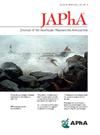The potential feasibility of tobacco-focused medication therapy management in pharmacies affiliated with Federally Qualified Health Centers: Perspectives of pharmacists
IF 2.5
4区 医学
Q3 PHARMACOLOGY & PHARMACY
Journal of the American Pharmacists Association
Pub Date : 2024-08-23
DOI:10.1016/j.japh.2024.102210
引用次数: 0
Abstract
Background
Tobacco-focused medication therapy management (MTM) interventions executed in pharmacies located in Federally Qualified Health Centers (FQHC) may provide an innovative means to reach smokers with low incomes and reduce health disparities. However, greater understanding of the intervention’s potential feasibility in this setting is needed.
Objective
To inform the feasibility of implementing an MTM program to address tobacco and nicotine dependence in the FQHC setting by assessing the experience and perceptions of pharmacists working in pharmacies associated with FQHCs.
Methods
A convergent mixed methods approach was used to assess indicators associated with the domains of the Consolidated Framework for Implementation Research (CFIR). Pharmacists from FQHC-based pharmacies in the Southeast United States completed surveys (n = 24) and interviews (n = 15). Quantitative data were summarized descriptively. Qualitative data were content coded.
Results
Quantitative and qualitative data were mapped across all 5 CFIR domains. Pharmacists report high rates of tobacco and nicotine use among their patients and that addressing their use is important. A total of 62.5% of pharmacists had some or a great deal of experience with tobacco and nicotine dependence. Quantitative and qualitative data demonstrate that the pharmacists and their FQHCs would support MTM efforts focused on tobacco and nicotine dependence. Qualitative findings highlight that pharmacists view an MTM intervention as aligning with their current workflow. Quantitative and qualitative data highlight how factors related to pharmacists’ engagement in introducing tobacco and nicotine dependence treatment programs to patients, the electronic medical record, time, staffing, and patient-level barriers could impact the feasibility of an MTM intervention focused on tobacco and nicotine dependence.
Conclusion
Findings suggest an MTM intervention focused on tobacco and nicotine dependence has the potential to be feasible within FQHC-based pharmacies. Considerations related to training, staffing, time, identifying participants, and supporting participant engagement must be taken into account to support its implementation.
联邦合格医疗中心下属药房开展以烟草为重点的药物治疗管理的潜在可行性:药剂师的观点。
背景:在联邦合格医疗中心(FQHC)的药房实施以烟草为重点的药物治疗管理(MTM)干预措施,可为低收入吸烟者提供一种创新手段,并减少健康差异。然而,还需要进一步了解该干预措施在这种环境下的潜在可行性:通过评估在联邦定点医疗机构相关药房工作的药剂师的经验和看法,了解在联邦定点医疗机构实施MTM项目以解决烟草和尼古丁依赖问题的可行性:采用聚合混合方法评估与实施研究综合框架(CFIR)领域相关的指标。来自美国东南部以 FQHC 为基础的药房的药剂师完成了调查(24 人)和访谈(15 人)。对定量数据进行了描述性总结。对定性数据进行了内容编码:结果:定量和定性数据在所有五个 CFIR 领域中均有体现。药剂师报告称,患者中使用烟草和尼古丁的比例很高,因此解决患者使用烟草和尼古丁的问题非常重要。62.5%的药剂师在烟草和尼古丁依赖方面有一些或很多经验。定量和定性数据表明,药剂师和他们所在的 FQHC 将支持以烟草和尼古丁依赖为重点的 MTM 工作。定性研究结果表明,药剂师认为 MTM 干预与其当前的工作流程相一致。定量和定性数据强调了药剂师参与向患者介绍烟草和尼古丁依赖治疗项目、电子病历、时间、人员配备以及患者层面的障碍等相关因素如何影响以烟草和尼古丁依赖为重点的MTM干预的可行性:研究结果表明,以烟草和尼古丁依赖为重点的MTM干预措施有可能在以FQHC为基础的药房中可行。必须考虑到与培训、人员配备、时间、确定参与者以及支持参与者参与有关的因素,以支持其实施。
本文章由计算机程序翻译,如有差异,请以英文原文为准。
求助全文
约1分钟内获得全文
求助全文
来源期刊
CiteScore
3.30
自引率
14.30%
发文量
336
审稿时长
46 days
期刊介绍:
The Journal of the American Pharmacists Association is the official peer-reviewed journal of the American Pharmacists Association (APhA), providing information on pharmaceutical care, drug therapy, diseases and other health issues, trends in pharmacy practice and therapeutics, informed opinion, and original research. JAPhA publishes original research, reviews, experiences, and opinion articles that link science to contemporary pharmacy practice to improve patient care.

 求助内容:
求助内容: 应助结果提醒方式:
应助结果提醒方式:


